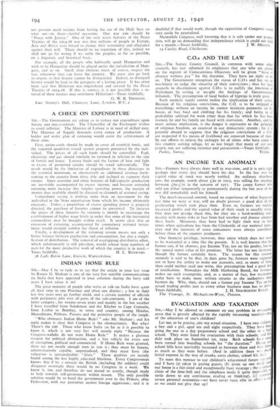INDIAN HOME RULE
SIR,—May I be so rude as to say that the article in your last issue by Ranjee G. Shahani is one of the very few sensible communications on India that have appeared in your columns during the forty odd years I have taken it in?
The great majority of people who write or talk on India have spent all their time in one Province and often one district ; a few in their last five years may go further afield, and a certain number of officials with peripatetic jobs visit all parts of the sub-continent. I am of the latter category ; for twenty-seven years and mainly in the hot weather I have travelled from Sandeman and the Khyber to Cape Comorin, from Lashio to Bombay, in town and country, among Hindus, Mussulmans, Pathans, Parsees and the primitive people of the jungle.
" Who obstructs Indian Home Rule? " asks Mr. Shahani ; and his reply makes it clear that Congress is the obstructionist. But why? There's the rub. Those who know India (as far as it is possible to know it, which is not very far) will mostly reply "Because the Congress-wallahs do not want Home Rule." It makes a glorious weapon for political obstruction, and a fine vehicle for every sort of corruption, political and commercial. If Home Rule were granted, there are not nearly enough men to run it ; they must be honest, administratively capable, unprejudiced, and they must have (the vulgarism is untranslatable) " Guts." These qualities are mainly found among the less highly educated Moslems. Every Congressman knows that if by a miracle the British (including the soldiers) could disappear overnight there would be no Congress in a week. We know it, too, and therefore do not intend to scuttle, though ready to help towards self-government within reason. The only possible solution would be to hand the government over to the Princes, after Federation, with our guarantee against foreign aggression ; and it is doubtful if that would work, though the opposition of Congress would very easily be neutralised.
Meanwhile Congress, well knowing that it is safe under our protec- tion, will go on demanding that independence which it could not hold






























 Previous page
Previous page